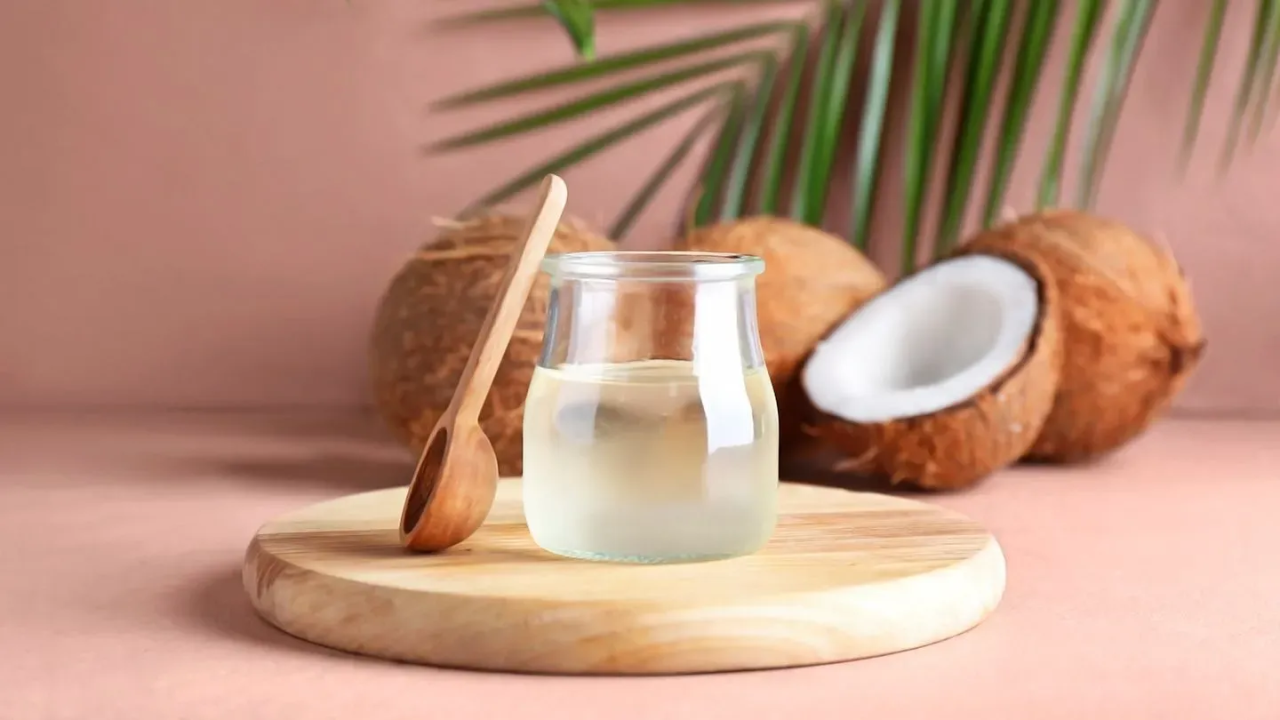Is coconut oil is good for skin

Introduction
Coconut oil has gained immense popularity as a natural skincare product. Derived from the flesh of mature coconuts (Cocos nucifera), it’s renowned for its moisturizing properties, pleasant aroma, and versatility. Many people incorporate coconut oil into their skincare routines, believing it can improve skin health, treat various skin conditions, and serve as a natural alternative to commercial products. But is coconut oil truly beneficial for the skin? To answer this question comprehensively, we need to explore its composition, benefits, potential risks, scientific evidence, and practical usage tips.
1. Composition of Coconut Oil
Understanding the composition of coconut oil is fundamental to assessing its effects on the skin. Coconut oil primarily contains:
- Saturated Fats (about 90%): Predominantly medium-chain triglycerides (MCTs), especially lauric acid (~50%), along with caprylic and capric acids.
- Vitamins and Antioxidants: Such as vitamin E, polyphenols, and phytosterols.
- Other Compounds: Minor components like phenolic compounds that have antioxidant properties.
The high lauric acid content gives coconut oil its antimicrobial properties, while its fatty acids contribute to skin barrier repair and hydration.
2. Potential Benefits of Coconut Oil for Skin
a. Excellent Moisturizer
Coconut oil is widely regarded as an effective moisturizer due to its ability to penetrate the skin and form a barrier that prevents water loss. Its emollient properties can help alleviate dry, flaky, or irritated skin.
- Evidence: Multiple studies suggest that coconut oil improves skin hydration. A 2014 study published in the Journal of Cosmetic Science found that virgin coconut oil was more effective than mineral oil in moisturizing the skin.
b. Antimicrobial and Antifungal Properties
Lauric acid in coconut oil exhibits antimicrobial activity against bacteria, fungi, and viruses. This makes coconut oil potentially useful in managing skin infections and conditions like athlete’s foot or fungal dermatitis.
- Evidence: Laboratory studies demonstrate coconut oil’s efficacy against pathogens like Staphylococcus aureus, Candida albicans, and others.
c. Skin Barrier Support
The fatty acids in coconut oil can help reinforce the skin’s natural barrier, preventing transepidermal water loss and protecting against environmental irritants.
d. Anti-inflammatory Effects
Some research indicates that coconut oil’s antioxidants and fatty acids can reduce skin inflammation and soothe irritated skin, making it useful for conditions like eczema or psoriasis.
e. Wound Healing
Preliminary studies suggest coconut oil may promote wound healing by reducing infection risk and supporting tissue regeneration, although more research is needed.
f. Anti-Aging Properties
While evidence is limited, the antioxidants present in coconut oil could combat free radicals, potentially slowing signs of aging like wrinkles and fine lines.
3. Potential Drawbacks and Risks
Despite its benefits, coconut oil isn’t suitable for everyone or every skin type. Potential concerns include:
a. Comedogenicity
Coconut oil is classified as a “comedogenic” substance, meaning it can clog pores. People with oily or acne-prone skin may experience breakouts or worsen existing acne.
- Rating: On the comedogenic scale, coconut oil scores around 4 out of 5, indicating a relatively high likelihood of pore blockage.
b. Allergic Reactions
Although rare, some individuals may develop allergic contact dermatitis or skin irritation when using coconut oil, especially if they have a coconut allergy.
c. Not Suitable for Sensitive Skin
In some cases, coconut oil can cause irritation or exacerbate skin sensitivity, particularly if used in excess or on broken skin.
d. Limited Sun Protection
Coconut oil offers minimal protection against UV radiation. Relying solely on it for sun protection is not advisable.
4. Scientific Evidence and Clinical Studies
While anecdotal reports and traditional use support coconut oil’s benefits, scientific research provides mixed results:
- Moisturizing Effect: Well-supported by studies showing that coconut oil improves skin hydration.
- Antimicrobial Effectiveness: Demonstrated in vitro (lab) studies, but clinical trials on humans are limited.
- Acne and Oily Skin: Some evidence indicates coconut oil may worsen acne in certain individuals due to its comedogenic nature.
- Eczema and Psoriasis: Some small studies suggest coconut oil can reduce symptoms, but more extensive research is necessary.
Key Takeaway: Coconut oil can be beneficial for dry, normal, or mature skin, but caution is advised for oily or acne-prone skin.
5. How to Use Coconut Oil for Skin
a. Choosing the Right Type
- Virgin or Extra Virgin Coconut Oil: Cold-pressed, unrefined, and minimally processed oils retain more nutrients and antioxidants.
- Refined Coconut Oil: Usually deodorized and processed, with fewer nutrients but a neutral scent.
b. Application Tips
- Patch Test: Always perform a patch test before widespread use to check for allergic reactions.
- Clean Skin: Apply on clean, dry skin.
- Amount: Use a small amount to avoid clogging pores.
- Frequency: Daily or as needed, depending on skin type and condition.
c. Specific Uses
- Moisturizer: Apply to face, body, or hands.
- Makeup Remover: Gentle removal of makeup.
- Lip Balm: Soften chapped lips.
- After Sun: Moisturize and soothe skin after sun exposure.
- Wound Care: Apply on minor cuts or abrasions after cleaning.
6. Considerations and Precautions
- Skin Type: Assess your skin’s response; if prone to acne, use sparingly or avoid.
- Allergies: Confirm no coconut allergy.
- Sun Exposure: Use in conjunction with sun protection, as coconut oil does not block UV rays.
- Consultation: For skin conditions like eczema or psoriasis, consult a dermatologist before use.
7. Alternatives and Complementary Products
Coconut oil can be part of a broader skincare routine. Alternatives include:
- Other Natural Oils: Argan oil, jojoba oil, almond oil, which may be less comedogenic.
- Moisturizers with Added Benefits: Products containing ceramides, hyaluronic acid, or niacinamide.
- Sun Protection: Use broad-spectrum sunscreen.
8. Summary and Conclusion
Is coconut oil good for skin?
In summary:
- Yes, for many people, especially those with dry, normal, or mature skin, coconut oil can serve as an effective moisturizer, antimicrobial agent, and skin barrier enhancer.
- Its antioxidant and anti-inflammatory properties may benefit certain skin conditions.
- Caution is advised for those with oily, acne-prone, or sensitive skin due to its potential to clog pores and cause irritation.
- Scientific evidence supports moisturizing and antimicrobial benefits, but more rigorous clinical studies are needed to confirm its efficacy for specific skin conditions.
Final thoughts:
Coconut oil is a versatile, natural skincare option with proven benefits, especially for dry skin. However, individual responses vary, and it’s essential to consider your skin type, allergies, and skincare goals. Always perform patch tests and consult professionals if you have underlying skin conditions or concerns.
References and Further Reading
- Agero AL, et al. (2002). “The antimicrobial activity of virgin coconut oil and its fatty acids.” International Journal of Dermatology.
- Dayrit CS. (2014). “The properties of lauric acid and their significance in coconut oil.” Journal of the American Oil Chemists’ Society.
- Verallo-Rowell VM, et al. (2008). “Topical virgin coconut oil treatment for mild to moderate eczema.” Dermatitis.
- Lin TT, et al. (2018). “Efficacy of coconut oil as a moisturizer in skin hydration.” Journal of Cosmetic Science.
- Fife C, et al. (2014). “The impact of coconut oil on skin hydration.” Dermatology Research and Practice.
Disclaimer: This overview provides general information. For personalized skincare advice, consult a dermatologist or skincare professional.
If you’d like, I can expand specific sections into more detail or provide additional insights on particular skin conditions or treatment protocols involving coconut oil.



